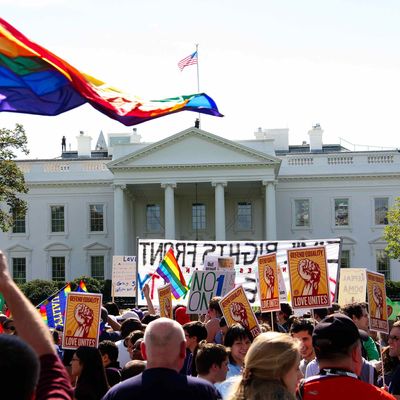
“It’s grim, I’ve got to say” is how Dr. Patrick Egan, an associate professor of politics and public policy at New York University, described the state of LGBT rights under President Donald Trump. Trump’s election has many LGBT Americans worried they’ll be stripped of their rights during his presidency, and although Trump himself is pretty progressive on LGBT issues — he’s even thrown the “Q” in there a couple times — he ran for office on one of the most anti-gay platforms in history. That, said Egan, is cause for concern. Because even if Trump doesn’t have a vendetta against LGBT Americans, his coalition (and his vice-president) do.
Luckily, one measure that’s likely safe from a Trump regime is marriage equality. During the primaries, Trump said he would “strongly consider” overturning the Supreme Court’s decision that allows same-sex couples to be married in all 50 states. But that’s not realistic, Egan said. Trump has promised to appoint conservative justices to the Supreme Court, but even with Justice Antonin Scalia on the bench, the court ruled in favor of same-sex marriage 5-4.
What’s more, for the court to even consider overturning its ruling, a relevant conflict on the issue of same-sex marriage would need to occur on a state level. Then, the court would need to agree to hear it. And even then, Egan said, the justices are unlikely to overrule a precedent that’s been established so recently. “Based on a fair amount of political science research, even the most ideological judges tend to be pretty reluctant to reverse established precedent,” he said. There’s also no call from the general population to reverse marriage equality — public-opinion polls have long shown an overwhelming majority of Americans to be in favor of marriage equality.
Another measure that probably won’t be overturned is the ability of LGBT Americans to serve openly in the military. “Don’t Ask, Don’t Tell” was repealed with wide support under the Obama administration in 2010, and there have been few calls to reinstate it.
But the Trump administration is likely to target LGBT rights in other ways, and one is by halting progress altogether. “We’re going to see absolutely no movement on any aspect of the LGBT rights agenda at the federal level,” Egan said. “So efforts to pass the equality act, which would establish employment discrimination rights for LGBT folks, are dead. And any other efforts to move the agenda on a legislative level through Congress are just not going to happen — that’s just completely dead in the water.”
What’s more, a lot of the work done behind the scenes by the Executive branch of the Obama administration — things like making sure same-sex couples received tax benefits and survivors’ benefits, and awarding grants to LGBT social-services organizations — will be discontinued. “In individual lives, this sort of withdrawal of support within executive agencies for LGBT efforts is going to be felt quite profoundly,” Egan noted.
That includes any sort of support for transgender individuals. The White House’s sweeping guidelines for protecting transgender students from discrimination in public schools? Gone. In fact, the Trump administration is likely to stand behind state judges who rule against the guidelines. It remains to be seen how the Supreme Court will rule in precedent-setting cases such as G.G. v. Gloucester County School Board, in which a trans student sued his school for barring him from the men’s restroom. But it’s unlikely Trump’s administration will openly oppose discriminatory “bathroom bills” as Obama’s has.
It’s also unlikely that Trump’s Department of Justice — which could be headed by Rudy Giuliani — will do much to address discrimination against LGBT individuals on a state level. “My sense is, to the extent they take sides at all, they will take sides with those businesses and individuals who are discriminating and claiming they’re doing so on the basis of their religious beliefs,” Egan said.
He added, “An interesting question is, with Republicans in control of both Houses of Congress and the presidency, will some kind of stronger version of a religious freedom law be introduced in Congress by Republicans and be signed by Trump? My expectation is yes.” The best way for Democrats in the House — and particularly in the Senate — to oppose such a law would be through filibustering, or holding the congressional floor until a vote on a bill becomes impossible. But there’s some indication Republican majority leader Mitch McConnell might seek to end the filibuster altogether.
Although it’s hard to parse where Trump stands on any given issue, he hasn’t been outwardly hostile toward the LGBT-rights movement. “I think it’s sort of a nonissue for him,” Egan said. Whether or not Trump moves to restrict LGBT rights will depend instead on whether or not he feels the need to pay back the Christian right for its support — and whether he listens to input from the conservative groups galvanized by his victory. In other words, we don’t know how Trump will respond to anti-LGBT bills until they cross his desk next year.
But one thing is clear: Trump’s administration will be a giant step backward for LGBT inclusion and equality. “I don’t think we’re being alarmist,” Egan said. “I think he’s leading a party where most of the energy in the party comes from people who have really been eager to change the trajectory of things, and they’re going to use this opportunity to do it.”




